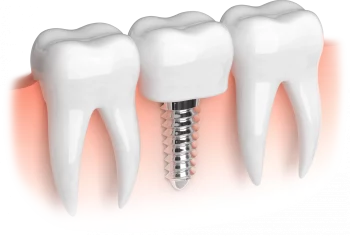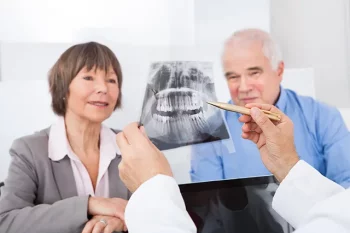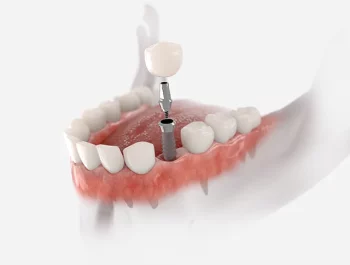Edentulism, or missing teeth, is common in the United States. In fact, according to research, 120 million adults are missing at least one tooth. Experts expect this to increase within the next 2 decades. Edentulism affects the most vulnerable populations, the economically disadvantaged, and the aging. In the senior population, approximately 23 million people are missing all their teeth and approximately 12 million are missing at least one arch.
Most people who are missing teeth have dentures because they are the most budget-friendly solution. However, at Clarksburg Dental, we believe that dental implants are a much better, more natural solution.
 What is a Dental Implant?
What is a Dental Implant?A dental implant is a medical device that is surgically inserted into the jawbone to restore a patient’s ability to speak and chew. In addition, it improves their appearance. It provides a base for artificial teeth, such as crowns, bridges, and dentures.
If you are considering dental implants, we encourage you to schedule a consultation right away. We will discuss the benefits and drawbacks and determine whether or not you are eligible for this procedure.
Dental implant surgery is not a one-and-done procedure. There are several steps that you must go through. The entire process will take at least several months and may take up to a year or more, depending on your situation.
If you are considering dental implants to address your missing teeth, you should have a general idea of what to expect. Since every patient is different, it’s best to consult with Dr. Edmund Liu or Dr. Chung Lin and the team at Clarksburg Dental to know what to expect, but the general steps to the dental implant procedure are:
If you believe that dental implants are a good tooth replacement solution for your missing or damaged teeth, the very first step is to schedule a consultation. At that time, you’ll discuss which type of dental implant you need. There are two basic choices:

If you are replacing a tooth that is damaged, you will need to have it extracted. This will be a separate procedure and will require at least a local anesthetic as well as time to heal.
If the dental team determines that your jawbone isn’t strong enough to handle a dental implant, you will be scheduled for a bone graft. During this procedure, the dentist will take bone from elsewhere and add it to your jawbone. In some cases, we may use synthetic bone-grafting material. Once this is done, it may take 4 months to 1 year to heal and be able to accommodate the implant. If only minor bone grafting is required, we may be able to do this at the same time the implant is placed.
When it comes time to place the implant, a small cut will be made in your gum, and a hole drilled in your jawbone. This is where the titanium screw will be placed. This will act as a tooth root for the implant- just like your natural tooth roots, you will not be able to feel it once it’s implanted. Typically, it takes 4 to 7 months for the jawbone to fuse with the implant.
Once the jawbone has healed around the implant, a healing cap will be placed. This will be even with your gum and acts as a metal collar, encouraging the gum to heal around it to prepare for the placement of the abutment, and ultimately the crown. This usually takes about 2 weeks.

Once the gum has healed around the cap, it will be removed. At this time, the abutment- connector that connects the implant with the crown- will be attached. We will also place a temporary crown which you will have for 4 to 6 weeks. This allows the gums to heal.
Once your temporary crown is placed, the lab will start working on your permanent crown, which generally takes 2 to 3 weeks. When we get ready to place it, it will either be screwed to the abutment or cemented. Crowns that are cemented are more natural-looking but it’s easier for us to remove crowns that are screwed on if there is an issue with the implant.
While this process does take some time, each step is manageable. Most patients only need a local anesthetic. However, if you have dental anxiety, sedation options can be discussed. Following the procedure, you may have some swelling, soreness, or minor discomfort.
Dental implants offer benefits that other tooth replacement solutions don’t. Some of these benefits are:
When you lose teeth, you also lose bone density in your jawbone. In order to stay healthy, your jawbone needs stimulation from the tooth roots. Dental implants are inserted in the bone, which replaces that stimulation, preventing bone loss.

Dental implants are available in various shapes and sizes. They can be customized to match your natural teeth and fit perfectly where the missing tooth was. Unless you tell someone, no one will know that it’s not a real tooth.
Since the implants are inserted into your jawbone, replacing the tooth root, you can bite with basically the same force as before. Other tooth replacement solutions don’t offer this because they are placed on top of your gums instead of being anchored in place.
When you lose teeth, you start looking older. This is because your teeth support your facial structure and without them, your face begins to sag. Dental implants keep this from happening.
Allows clear speech
Missing teeth can alter your speech and some tooth replacement options, such as dentures, can also affect your ability to speak clearly. Since dental implants are the most like your natural teeth, you can speak naturally and clearly.
While you still need to care for your dental implants just like you would your natural teeth, to prevent bacteria build-up, they won’t decay.
Taking care of dental implants is just like taking care of your natural teeth. You don’t need any special products- just brush and floss like normal.
Dentures are known to slip/slide around in your mouth when speaking, eating, laughing, or even smiling. Since implants are inserted into your jawbone, you don’t have to worry about them moving around.
Gaps left by missing teeth can cause neighboring teeth to shift. This causes your teeth to become misaligned. Dental implants fill those gaps, keeping your smile straight and even.
Dental implants are permanent- they will last the rest of your life. Other tooth replacement solutions will require repair or replacement over time.

At Clarksburg Dental, we believe that you should weigh the pros and cons of a procedure before making a decision. Some of the drawbacks of dental implants include:
There are several surgeries involved in placing a dental implant, especially if you need to have extractions or bone grafts.
Though rare, complications may occur years after the implants are placed. However, these complications can be easily addressed and corrected.
The average cost of a single dental implant is between $5000 to $7000. This covers the implant and the surgery and includes a porcelain crown. This does not include other procedures such as extractions or bone grafting/sinus lifting.
The average cost of full-mouth implants is around $43,000 and may be as high as $56,000.
Our friendly office staff at Clarksburg Dental will work with your dental insurance to determine coverage. We can also explain our financing options. We work with Compassionate Finance, allowing patients to choose from a variety of personalized payment plans. The application process is easy and everyone that has a bank account qualifies.
Dental implants are a permanent solution for missing teeth. How do you know if you are eligible for dental implants? Schedule a consultation with the team at Clarksburg Dental today to find out. Here are some of the criteria we use:
If you are missing teeth and believe that dental implants may be the best solution for you, consider scheduling your consultation with Dr. Edmund Liu or Dr. Chung Lin and the dental team at Clarksburg Dental today. We are located in Germantown, Maryland on Crystal Rock Drive. Our hours are Monday through Thursday, 7:00 AM to 7:00 PM. This is to accommodate our patients who work full time.
We will work with you to help you determine which tooth replacement solution is best for you. We look forward to helping you get back your smile, functionality, and confidence!
 Dental Implant FAQ’s
Dental Implant FAQ’sDental implants are meant to be a permanent solution for missing teeth. They last longer than other options and should last for the rest of your life.
Most patients only experience minor discomfort during the healing process. In fact, the procedure itself is comparable to a tooth extraction. Once the implant is in place, you won’t even notice a difference.
There are a few things you can do to manage any pain you do experience: follow the dentist’s instructions regarding aftercare, practice proper oral hygiene, take prescription or OTC medications as directed, stick to an appropriate diet, and avoid smoking or drinking alcohol.
Dental implants are more common in older people because risk of tooth loss increases with age. Still, from time to time, we have younger patients come to us because they need a tooth replaced. We recommend against dental implants for patients under the age of 18 because by this time, all of the patient’s permanent teeth should be in. There are a few exceptions: in some cases, an implant may be used as an anchor for orthodontic treatment in teens.
Everyone is different, but most patients can return to work the day after the procedure. However, in some cases, patients must take more than 1 or 2 days off. There is the potential for complications that may extend your recovery. Ultimately, you know your body better than anyone. You may go back to work as soon as you feel able.